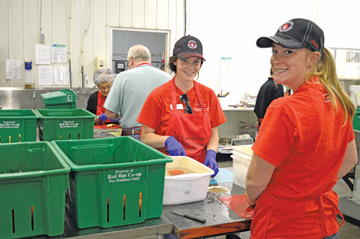Current Temperature
23.4°C
Gleaning local community spirit through global food aid
Posted on July 19, 2016 by 40 Mile Commentator Photo by Tim Kalinowski- The Prairie Gleaners Society is in need of more volunteers to help do its important work of sending emergency food aid around the world. Pictured: Outgoing Stampede Queen Ali Mullin and Princess Makayla Chambers were doing their part to get the message out a few weeks back.
Photo by Tim Kalinowski- The Prairie Gleaners Society is in need of more volunteers to help do its important work of sending emergency food aid around the world. Pictured: Outgoing Stampede Queen Ali Mullin and Princess Makayla Chambers were doing their part to get the message out a few weeks back.By Tim Kalinowski
Access to food is one of the most fundamental aspects of life. In Southern Alberta it is too often something we take for granted. Here we have an abundance and the resources to grow and produce in numbers completely unimagined in other corners of the world wracked by war, famine and climate change. The Prairie Gleaners Society, located on Range Road 63 in Cypress County just south west of Medicine Hat, is trying to do its part to help feed the world and to reduce food wastage in this region of the province. It’s dedicated core of two dozen volunteers work five days a week to cut up produce, donated by local producers and greenhouses, dehydrate it, bag it up and provide these resources free of charge to various international aid organizations. Prairie Gleaners President James Smith explains further.
“This past year, in 2015, we produced enough to provide 3.5 million servings of dehydrated product,” says Smith. “All sourced right from this immediate area in Cypress County. It’s just a drop in the bucket, but we try to respond to some of the most urgent needs in the world. Our volunteers realize this is something where we can contribute in a meaningful way. Dehydrated can go anywhere in the world.”
The Prairie Gleaners Society is completely non-profit, but it does not need to strain itself to find available produce. Local greenhouses and producers drop off loads by the tonne, and would happily provide more if they could.
“All the produce comes to us for free,” confirms Smith. “It is all donated to us. Sadly, in society today we buy with our eyes. We get tomatoes that are getting to be a little over-ripe from the grocery stores’ perspective. The veggies might be a little misshapen and not uniform in colour. They may have small blemishes. You think of carrots that might be broken or split coming out of the ground. You don’t see these in the grocery store, but there is absolutely nothing wrong nutritionally with any of it.”
The problem is, says Smith, Prairie Gleaners has a limited volunteer pool to draw on, and most of those elderly and retired. With more willing bodies, they could take far more food than they already do.
“If you asked any one of them, a very common answer would be: They get it. They want to do something worthwhile in retirement rather than sitting around Tim Horton’s wasting time. A lot of them like the idea of being able to contribute in a meaningful way, and they can do that here. It’s also quite a social time when they are all out here. Anybody and everybody is welcome here.”
Smith says the work the Prairie Gleaners do is more than worthwhile, and that’s what keeps everyone who comes motivated to give their all.
“The fact we can transport this anywhere in the world, and provide this nutrition, is what makes it such a great product and in demand with aid organizations. To me, this is the perfect way to get this vital nutrition anywhere in the world, and save food that is now going to waste around the world. Our product has gone to roughly about 50 countries around since we started operating eight years ago.”
Pam McFaul is one of those dedicated daily volunteers who gives her time to cut up and process vegetables coming in. She has been coming to help out at the Prairie Gleaners Society for the past five year with her husband Brian.
“It’s such a good organization because all this food would get wasted if they weren’t here,” she says. “We do need lots more volunteers to help to be able to accept more food that would otherwise be thrown away. It’s not rocket science. All you got to do is prep the vegetables and the drying machine does the rest.”
McFaul says her work with the Gleaners has helped open her eyes to the many problems in the world in places where there is just not enough food to go around. It feels good to be doing something about it, she says.
“It gets in your blood! I am a big mouth. I tell everybody I think should know about this place. You are feeding people who are unable to help themselves. It’s so sad to see so many people starving, in our country too. People need to be taught to grow their own food and not waste.”
Leave a Reply
You must be logged in to post a comment.

